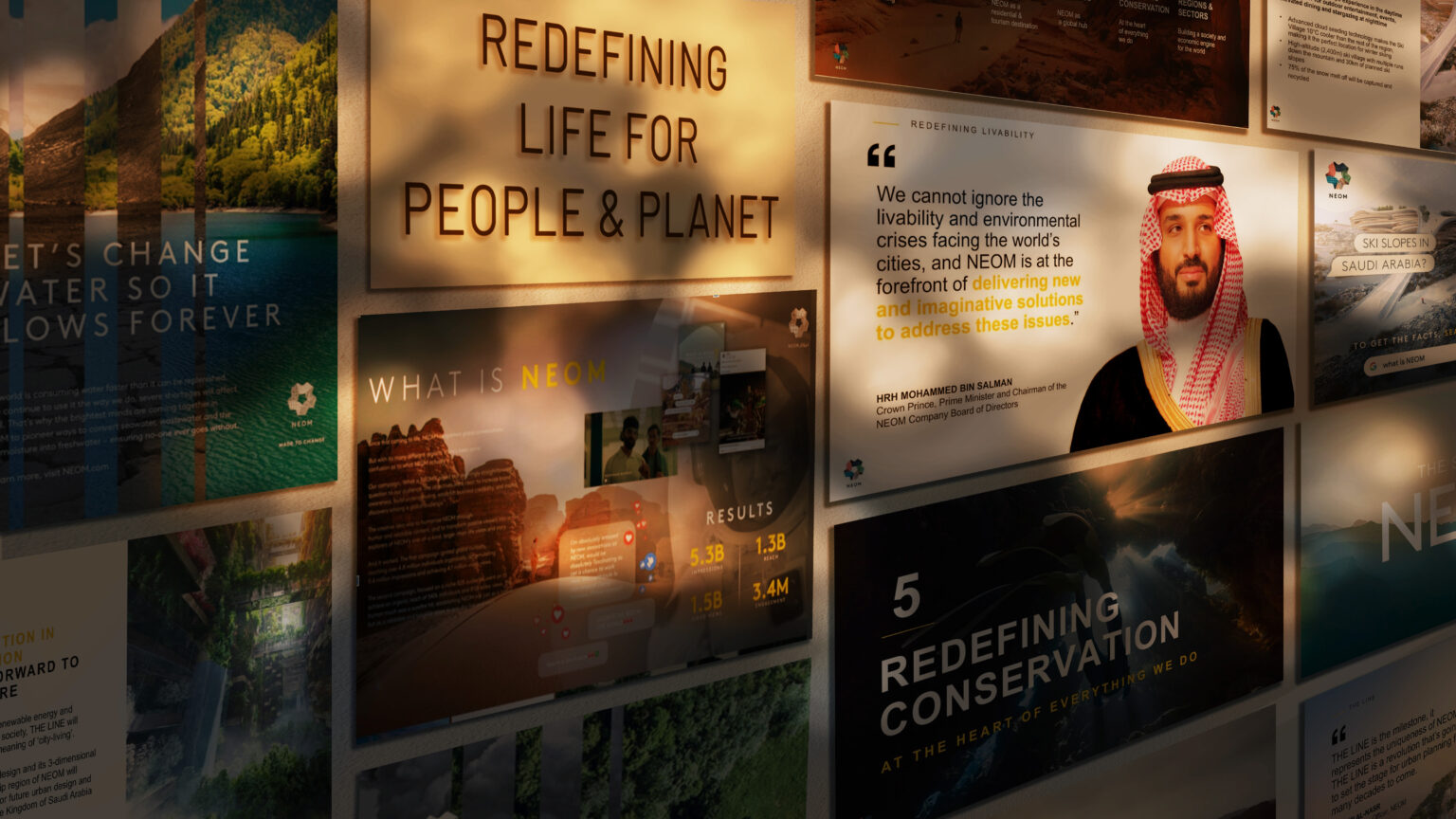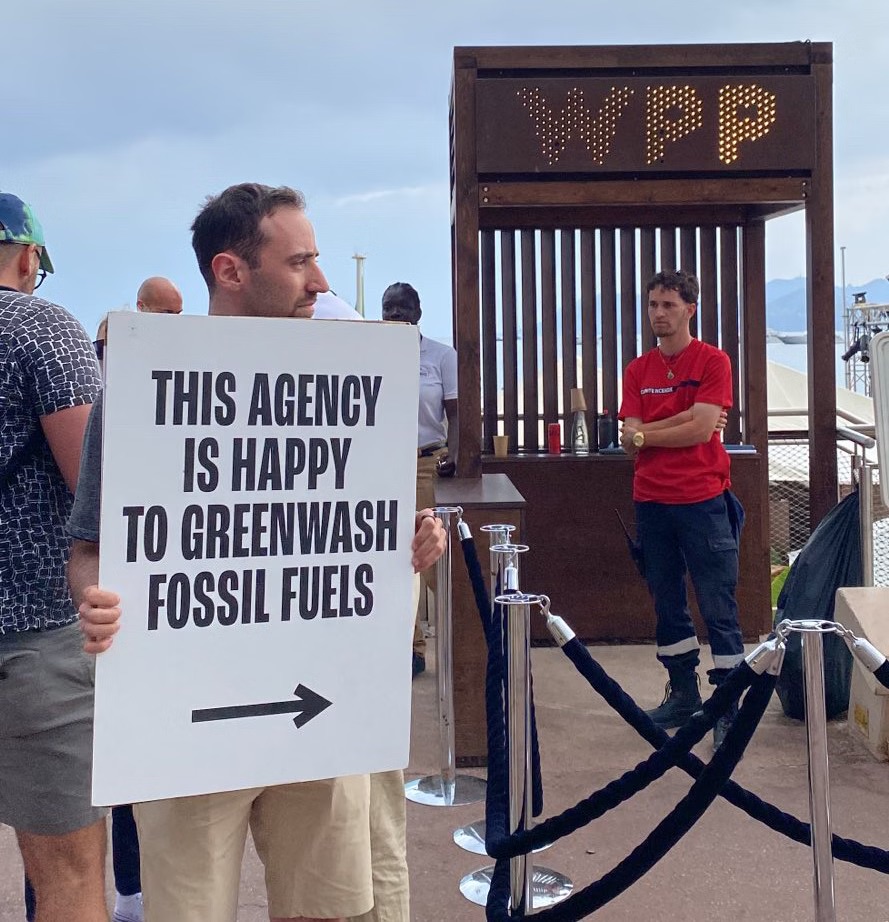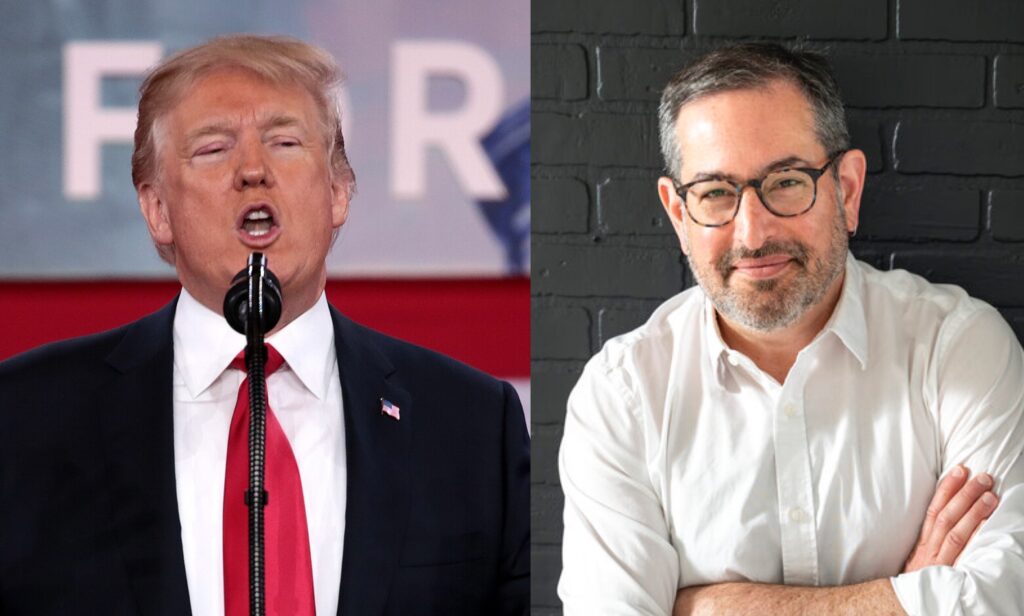The video opens with the voice of a child. “Since the beginning, we’ve changed things,” she says. “It’s in our genes. It’s what makes us human.”
The viewer zooms through stages in human development — agriculture, science, air travel, space flight. A dramatic musical score rises steadily in volume. “Now, we have a chance to change everything,” the narrator intones, as the camera comes to rest on a blank canvas.
After a beat, water explodes across the screen, soaking the frame. “Let’s change water,” she says, “so it flows forever. Energy, so it powers our lives sustainably.”
From climate change and food security to aging and mobility, the video proceeds topic by topic, issuing an inspiring call to action — one seen more than 22 million times on YouTube, and by countless others on massive screens in New York City’s Times Square.
“This is where we can change it all,” the narrator intones. “Neom,” she concludes, is “made to change.”
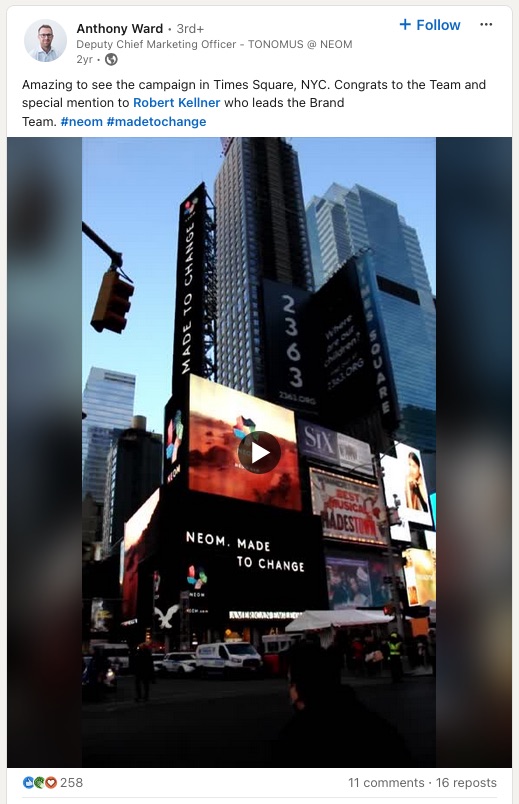
“Neom” is the brainchild and flagship construction project of Crown Prince Mohammed bin Salman, the ruler-in-waiting and de facto leader of Saudi Arabia. Designed hand-in-hand with elite Western consulting firms McKinsey & Company, Oliver Wyman, and Boston Consulting Group (BCG), and named for a combination of “neo” and “mustaqbal” — the Greek and Arabic words for “new” and “future” — Neom is portrayed as a futuristic, emissions-free utopia in the country’s northwest Tabuk province, which sits along the coast of the Red Sea. The mega-development is chaired by Crown Prince Mohammed and owned by the Public Investment Fund (PIF), Saudi Arabia’s $900 billion sovereign wealth fund, which the crown prince also chairs.
As the “made to change” video suggests, Neom’s promotional efforts often consist of fanciful digital renderings of luxurious resorts and futuristic cityscapes replete with lush greenery, vibrant natural wonders, and promises of ecological and environmental preservation. “Sustainability is a very big theme in everything that we do,” Rayan Fayez, Neom’s deputy CEO, told an audience in Rio de Janeiro in June.
Fayez was addressing an event organized by the Future Investment Initiative (FII) Institute, a PIF-led nonprofit that convenes investors and global power players in cities around the world. Some of America’s wealthiest investors and chief executives will be speaking at this year’s flagship FII gathering known as “Davos in the Desert” — which will take place in the Saudi capital of Riyadh from October 29-31 — including Eric Schmidt, the former CEO of Google; Stephen Schwarzman, the head of the private equity giant Blackstone; and Larry Fink, CEO of the asset manager BlackRock. The FII Institute counts Neom as a “strategic partner.”
Paradoxically for a project cloaked in green branding, Neom — or at least the idea of Neom — has emerged as an important asset in the Saudi government’s campaign to preserve global demand for fossil fuels.
“Mohammed bin Salman wants to be part of this … global concern with the climate,” said Madawi Al-Rasheed, a visiting professor at the London School of Economics (LSE) Middle East Centre. “But also, let’s not forget that the [Saudi] economy is based on oil, and this is one of the most polluting industries that you can imagine. … The whole country’s based on an oil company. They have to show that they’re diversifying, investing in other things.”
This dilemma has made Neom a core plank in Crown Prince Mohammed’s plan for the future of Saudi Arabia. Known as “Vision 2030,” the McKinsey–conceived roadmap ostensibly charts a course for the country to open itself to the world — primarily through tourism and foreign investment — while reducing its dependence on oil. Key to this transformation is an aggressive rebrand of the kingdom as a leader in the global fight against climate change.
It is a delicate challenge to portray the world’s largest oil exporter — and a documented opponent of global climate action, particularly at UN climate talks — as a champion of sustainability. But it is not a challenge that the Saudi government is attempting alone. DeSmog found that at least two-dozen communications firms mentioned in this story — including agencies specializing in PR, consulting, advertising, and video and graphic design — have together earned tens of millions of dollars helping Crown Prince Mohammed and the Saudi government develop and sell the idea of Neom.
To build up a picture of these companies’ activities, DeSmog reviewed hundreds of internal company documents; industry award submissions and press releases; social media posts and case studies published by staff and executives at Neom and many of the individual firms; as well as thousands of pages of documents filed with the U.S. Department of Justice (DOJ). (The Foreign Agents Registration Act requires American companies who advocate or lobby for foreign governments to disclose information about those activities, as well as the names of the employees involved in them, to the DOJ.)
If Neom’s marketing materials are to be believed, the city will soon offer a globally integrated, carbon-free home for billions of dollars’ worth of investor capital and millions of people from around the world, thanks to engineering and urban development marvels like The Line, a 170-kilometer-long, 500-meter-tall city “powered by 100 percent clean energy,” and Trojena, a mountainous region that promises to deploy cloud seeding to create an outdoor ski resort in the desert.
The Line provides “a blueprint for how people and planet can co-exist in harmony,” says a Neom press release distributed by Chicago-headquartered Edelman, one of the largest PR agencies in the world. Trojena, which is scheduled to host the Asian Winter Games in 2029, “confirms our commitment to be part of the global effort to protect the environment,” Crown Prince Mohammed says in another release, this one distributed by the New York City-based communications firm Teneo. In fact, all of Neom’s regions and projects “will be aligned in their respect for the environment and achieving balance, because Neom’s ambitious vision seeks to shape the future in which living and working are integrated in a sustainable way,” Teneo’s release says.
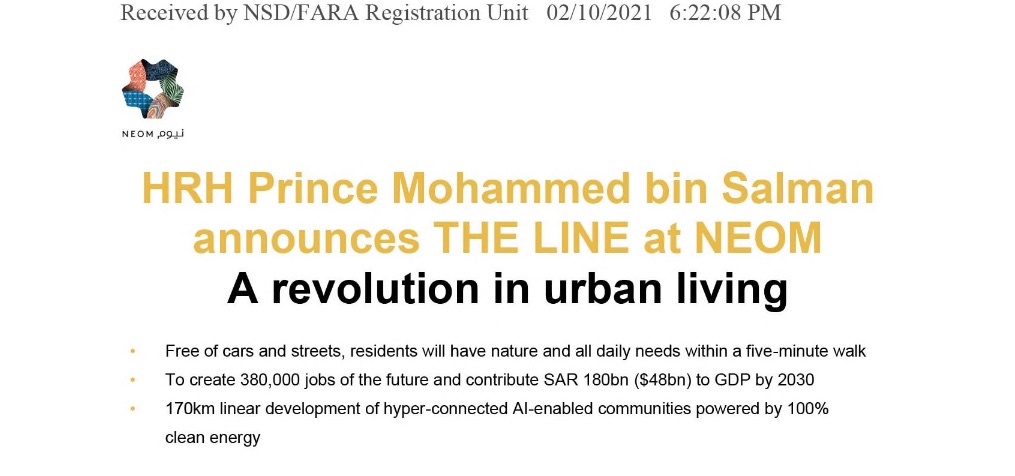
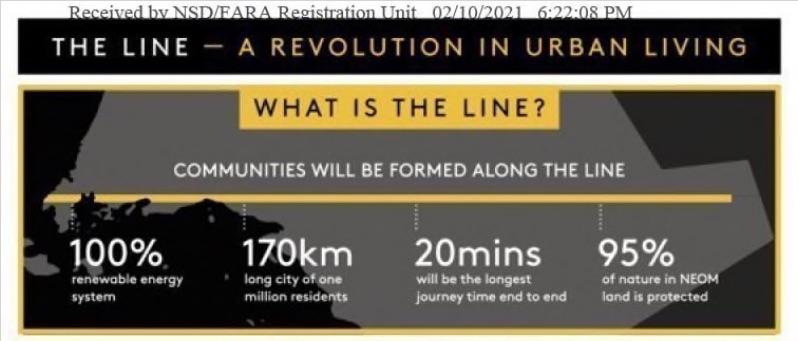
Experts told DeSmog that whether or not Neom is ever built, the reward for the Saudi government of involving so many prestigious firms goes beyond branding the country as green and legitimizing the crown prince’s hold on power. The scale of Western entanglement creates a financial dependence on Saudi largesse that makes it more difficult for these firms to disengage from Saudi Arabia — or for business leaders and government officials to speak out publicly — because of the Saudi state’s human rights abuses, its repression of civil and political liberties, or its efforts to obstruct global climate negotiations.
Following the October 2018 abduction and dismemberment of Washington Post journalist Jamal Khashoggi — an operation that Crown Prince Mohammed “approved,” according to a U.S. intelligence assessment — Western elites’ shunning of the kingdom ultimately proved as fleeting as their governments’ promises to isolate the crown prince. But the outcry, while short-lived, nonetheless served as a wake-up call for the crown prince and his allies, experts said, particularly as the government has faced criticism over allegations of forcibly evicting residents of the Tabuk province to make space for Neom.
“What they want is to create a substantial Western interest and personnel in Saudi Arabia in order to make Saudi Arabia defended by Western interests, should Saudi Arabia need that,” said LSE’s Madawi Al-Rasheed. “If you have a big population of Westerners in a country … then it becomes like a satellite state that has to be protected because Western interests are really intertwined with the local economy, and you can’t just abandon your people.”
The crown prince is “thinking about alternative ways of keeping Western interests alive in Saudi Arabia,” Al-Rasheed said. “These projects, these consultancy firms, the PR companies are all meant to create that bondage — an alternative to just one commodity, and that is oil.”
I. A ‘Golden Cash Cow’: Elite Agencies Capitalize on Neom
According to the documents reviewed by DeSmog, the list of firms that have signed contracts with Neom includes some of the world’s biggest marketing, advertising, and communications conglomerates and their subsidiaries, such as:
- Omnicom Group, including subsidiaries TBWA\Raad and adam&eveDDB;
- Publicis Groupe, including subsidiaries Starcom Worldwide, Leo Burnett, Publicis Media, and Saatchi & Saatchi;
- WPP, including subsidiaries ASDA’A BCW and Landor, as well as BCW and Hill & Knowlton (now Burson);
- Interpublic Group (IPG), including subsidiaries McCann Enterprise, McCann New York, and Craft Worldwide (all part of the McCann Worldgroup network);
- S4Capital, including subsidiary Monks (formerly Media.Monks); and,
- Avenir Global, including subsidiary Hanover Communications.
Independent agencies, such as Edelman, Teneo, KARV (formerly KARV Communications), Ruder Finn, and Brownstein Hyatt Farber Schreck have together won millions of dollars’ worth of additional work for Neom, as have countless smaller creative agencies, many headquartered in New York City and London.
This list of companies working to shape Neom’s image, which is not comprehensive, omits many of the lobbying and public affairs firms that work to shape the Saudis’ reputation in Washington, DC and other capitals. It also omits the 23 architecture studios shaping the city’s actual construction, according to a tally compiled by the architecture publication Dezeen.
Other U.S.-based companies, including FleishmanHillard and Prosek Partners, have been hired by the FII Institute, which frequently promotes Neom at its events. Yasir Al-Rumayyan, the head of the PIF and the chairman of the board of Saudi Aramco, the country’s state-run oil giant, also serves as chairman of the FII Institute. (There is no indication that FleishmanHillard, which is part of Omnicom, or Prosek Partners have worked for Neom directly.)
The FII Institute is run by Richard Attias, a former Publicis Groupe executive and longtime producer of the World Economic Forum (WEF), an annual gathering for global elites in Davos, Switzerland. These days Attias, who has close ties to the Saudi royal family, and his communications firm, Richard Attias & Associates, are largely known for hosting the FII’s “Davos in the Desert” in Riyadh. (The crown prince publicly launched Neom at the gathering in 2017.)
Beyond the FII, however, Attias and his company have also done significant work for Neom, including organizing “Discover Neom” tours to solicit foreign investment in cities ranging from Boston and Miami to Berlin, Paris, and Seoul, according to news reports and social media posts. The PR agency KARV’s work for Neom, which remains ongoing, is also run through Attias’s company.
A spokesperson for the office of Richard Attias told DeSmog in an email that Richard Attias & Associates “is a global strategic communications and events firm that works with more than 50 clients worldwide annually, including Neom. We have provided events services for the Discover Neom Roadshows from 2022 to 2023, and communications advisory since 2023.” The FII Institute, the spokesperson said, “counts more than 30 international and regional entities as strategic partners, and Neom is indeed one of them.”
***
DeSmog’s findings suggest that many PR and consulting companies have anchored themselves in the lucrative ecosystem of Neom and the Saudi government, in part by capitalizing on Crown Prince Mohammed’s desire to be perceived as taking action on climate change.
Sarah Leah Whitson, executive director of the nonprofit DAWN (Democracy for the Arab World Now), a Washington, DC-based nonprofit that was co-founded by Jamal Khashoggi, said the Saudi government is willing to spend vast amounts of money for purported Western expertise with little oversight. Put simply, Neom contracts are a “golden cash cow,” Whitson said. (One Neom-focused job opening in London, which was posted by a Publicis subsidiary, appealed to potential applicants by describing Neom as a client offering “unlimited content budgets.”)
In conversations with DeSmog, a former employee of a sustainability-focused subsidiary of one of the world’s biggest communications conglomerates described witnessing an aggressive, even desperate, push to win a contract with Neom.
The pitch, which eventually involved some of the conglomerate’s most senior executives, was for work to promote one of Neom’s widely touted environmental projects. The advertising agency’s history of working with clients seeking to advance their climate and environmental goals formed a key part of its appeal.
The former employee, who requested to share their story anonymously for fear of professional repercussions, expressed concerns to executives within the agency that Neom could be largely a greenwashing exercise for a government funded by, and committed to, oil extraction. The former employee also cautioned that the firm, by doing this work for Neom, could contribute to sanitizing the Saudi government’s human rights record.
When this employee shared their concerns internally, they were told that the agency’s participation in the pitch was vital because the agency had such a strong reputation for sustainability. After escalating concerns to more senior executives throughout the company, the former employee came to believe that they had been silenced and excluded from the project.
Eventually, the employee chose to leave the company after concluding that their position was no longer tenable — and that their concerns about sustainability and human rights, despite featuring prominently in the company’s code of conduct, would continue to be ignored.
As this employee’s experience suggests, for the Western creatives and communicators cashing in on Neom contracts, whether Neom’s flagship projects are actually green — or whether they are even ever likely to exist — appears to be of secondary importance to the task of portraying them that way. For these companies, “why not get in on the action? It’s easy money, with more to come,” said DAWN’s Sarah Leah Whitson.
II. ‘A Blank Canvas’: Crafting a Convenient Narrative
In response to a series of detailed questions, as well as requests for an interview and comments for this story, a spokesperson for Neom emailed a statement to DeSmog: “The Kingdom of Saudi Arabia is committed to net zero carbon emissions by 2060. Neom is supporting that goal by investing in emerging green technologies, including hydrogen production at scale, such as the world’s largest hydrogen plant … We are also committed to making our developments net zero emission zones upon completion, as we continue to focus on leveraging 100 percent renewable energy sources with sun and wind being abundant in this region of Saudi Arabia. In the construction phase of our developments, we are focused on decarbonizing, with the integration of circular economy principles including the use of carbon capture and utilization technology in our cement manufacturing plants.
“Sustainability is deeply woven into Neom’s ethos, values, business practices, and operations. One of our core commitments is to preserve 95 percent of Neom for nature. We are also regreening and rewilding native landscapes as part of our Neom Nature Reserve. Five native species have already been reintroduced to two native habitat zones, and more than three million trees, shrubs, and grasses have been planted across 750 hectares as part of our program to restore extensive natural habitats with 100 million native plants.”
In addition to Neom, as part of this investigation DeSmog contacted the firms mentioned in the story to request interviews and comments about their work for Neom. DeSmog also submitted a comment request to the Saudi embassy in Washington, DC. Most firms either declined to comment or did not respond. The embassy also did not respond.
In order to work for the Saudi government, many companies agree to aggressive confidentiality and nondisclosure terms. Earlier this year, for instance, McKinsey, Teneo, M. Klein & Company, and BCG defied a subpoena from the U.S. Senate Permanent Subcommittee on Investigations, which was examining the Saudi government’s efforts to influence U.S. policy through tactics such as “sportswashing,” telling senators that Saudi officials would not allow them to discuss their work.
“It’s simply staggering to me that American companies are not only willing to accept this claim, allowing the Saudi government to determine what is permitted to provide this subcommittee, but also that they would use it to justify their refusal to comply with a duly-issued congressional subpoena,” Senator Richard Blumenthal, the chairman of the subcommittee, said in a prepared statement for a February hearing with executives of the four firms.
Despite these strident nondisclosure terms, however, some companies have been more vocal about their work for Neom on their websites and on social media.
“From introducing a new model for urban sustainability powered by 100 percent renewable energy to creating hyper-connected communities centered around nature, not roads — [Neom’s] ‘living laboratories’ will embrace technology and innovation at scale to enhance liveability and answer some of humanity’s most urgent challenges,” McCann Enterprise wrote in a case study about its role in Neom’s “made to change” video. “Designed to inspire, it offers a tantalizing glimpse of what the future could look like.”
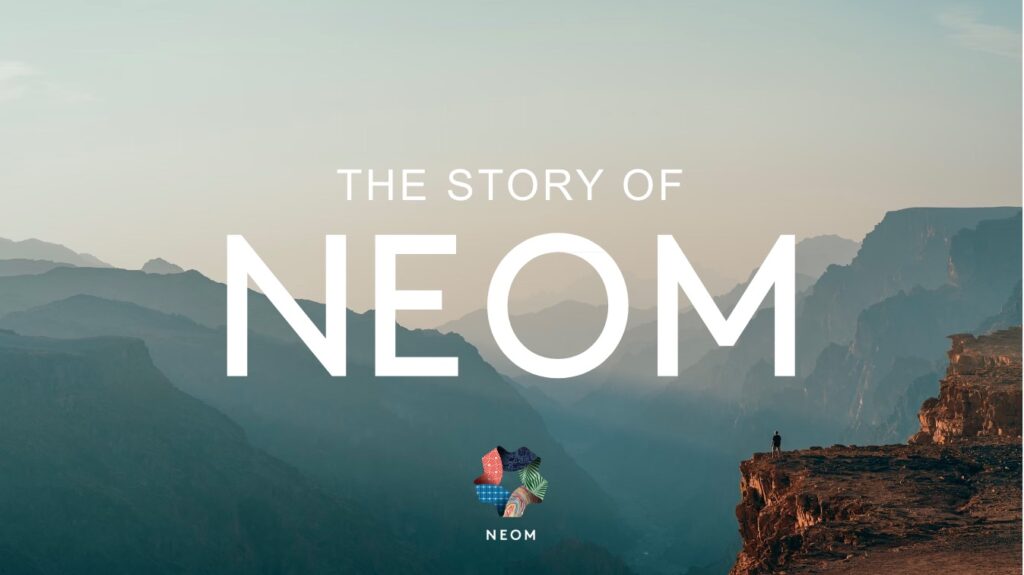
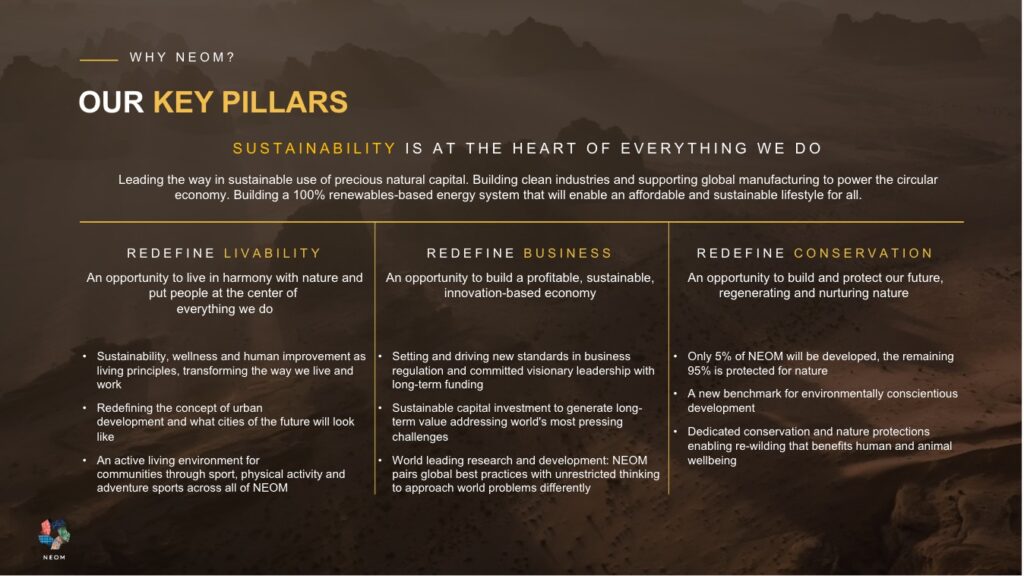
McCann Enterprise is part of the global network McCann Worldgroup, which itself is the creator of a 168-slide presentation titled “THE STORY OF NEOM.” This internal document, which was obtained by DeSmog, features detailed overviews of Neom’s regions and provides promotional language and graphics that have appeared repeatedly across Neom’s website, social media activity, videos, and other materials. The words “sustainable” and “sustainability” together appear 58 times throughout the document. McCann Worldgroup declined to comment.
“Sustainability is at the heart of everything we do,” the presentation states — a message McCann Enterprise has carried forth in much of its work for Neom. In the case study about the “made to change” video (part of what the agency called a “spectacular” campaign), McCann Enterprise described Neom as “a place designed to concentrate and accelerate the human drive for progress.” The city, the company said, is “a blank canvas for a new era of sustainable living.”
“The creative idea from McCann London positions Neom as a change-maker that will inspire the world as it reimagines a healthier, more responsible, efficient, sustainable, and balanced way of life, starting from a blank canvas,” echoes a LinkedIn post by Joy Films, a production company that worked on the “made to change” video and has been involved in promoting numerous Neom projects.
The “blank canvas” narrative is one that the Saudi government has promoted eagerly. “Since we have [an] empty place, and we want to have a place for 10 million people, then let’s think from scratch,” Crown Prince Mohammed said in a 2023 documentary about The Line on Discovery UK.

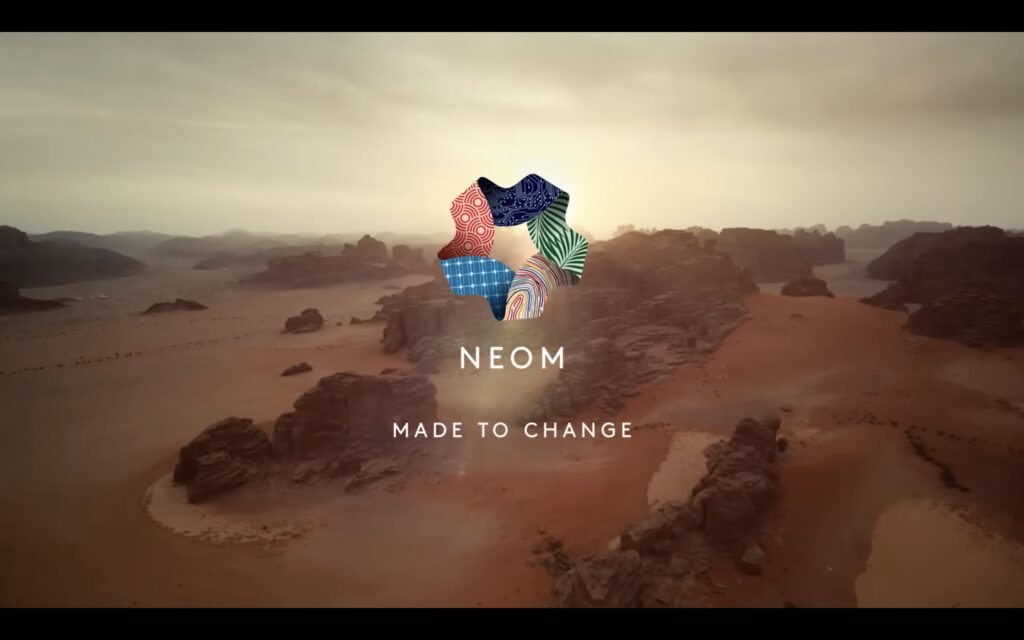
But the Tabuk province in northwest Saudi Arabia, where pieces of Neom are slowly being built, was neither blank nor empty before it was claimed for the city’s construction. The land’s longtime residents include members of the Huwaitat tribe, who the Saudi government began forcibly evicting at the beginning of 2020, according to a report from the international nonprofit ALQST for Human Rights. The tribal community, whose members had lived for centuries in what Western creative agencies repeatedly portray as empty, “was terrorized into submission,” DAWN’s Sarah Leah Whitson told DeSmog. “[We] haven’t heard a peep from them since.”
ALQST has documented that at least 15 Huwaitat people who opposed being displaced for Neom’s “blank canvas” have been sentenced “to prison terms of between 15 and 50 years.” Another five have been sentenced to death. In 2020 Abdul Rahim al-Huwaiti, a prominent Huwaitat protestor, was killed by Saudi special forces in his home. Earlier this year a former Saudi intelligence official told the BBC that the government had “licensed the use of lethal force against whoever stayed in their home.”
The forced eviction of the Huwaitat tribe and the death of Abdul Rahim al-Huwaiti have not captured global attention in the same way as the assassination of Jamal Khashoggi. But these developments have nevertheless been widely reported in the media and publicized by human rights advocates. In May 2023, a group of independent experts appointed by the UN warned that three members of the Huwaitat tribe were facing “imminent execution” for opposing their eviction for The Line. “We urge all companies involved, including foreign investors, to ensure that they are not causing or contributing to, and are not directly linked to, serious human rights abuses,” the UN experts wrote.
A handful of companies have proven willing to walk away from Saudi contracts. In July 2018, Gladstone Place Partners, an independent New York City-based communications firm, signed a nearly $200,000 agreement to promote Neom in U.S. markets and introduce the city’s CEO to Fortune magazine and other “top-tier media.” Gladstone terminated the contract shortly after Khashoggi’s disappearance. More recently, Malcolm Aw, the CEO of the renewable energy firm Solar Water, told Business Insider that he scrapped a $100 million contract with Neom to build solar-powered water desalination plants in the city after learning of the government’s aggressive eviction of the Huwaitat people.
But rather than walking away, most Western companies doing business with Neom appear to have chosen the more lucrative path of looking the other way, a pattern that appears likely to continue. “Spreading such large amounts of capital … through such a broad spectrum of elite American companies precludes that kind of blowback from happening again,” said DAWN’s Sarah Leah Whitson, referring to the global backlash that followed Khashoggi’s murder in 2018.
In fact, the Saudi government’s explicit commitment to extracting fossil fuels and obstructing global climate diplomacy, as well as its human rights abuses, ongoing political repression, and intolerance of dissent — such as decades-long prison terms for social media posts critical of Neom or the government itself — seem only to have created more demand for elite reputation cleansing.
One PR industry award framed that challenge as an opportunity: “The global sentiment around Neom … was one rooted in cynicism and confusion rather than excitement.”
III. ‘What is Neom?’: A Sprawling Web of Contracts
In 2023, the year after it painted Neom as “made to change,” McCann Enterprise returned for another piece of work, this time to present Google searchers, YouTube streamers, and social media scrollers with the question of “what is Neom?” — and then align their answers with a Neom-approved narrative.
As it had during the “made to change” campaign, the London agency teamed up with Monks, a “digital operating brand” of S4Capital, an advertising and marketing company founded by Sir Martin Sorrell, the founder and former head of the global conglomerate WPP. (Neom is “one of the most visionary, ambitious, thrilling, and motivating projects I have ever seen,” Sir Martin wrote of “made to change.”) Monks referred DeSmog to its statement on modern slavery and its code of conduct.
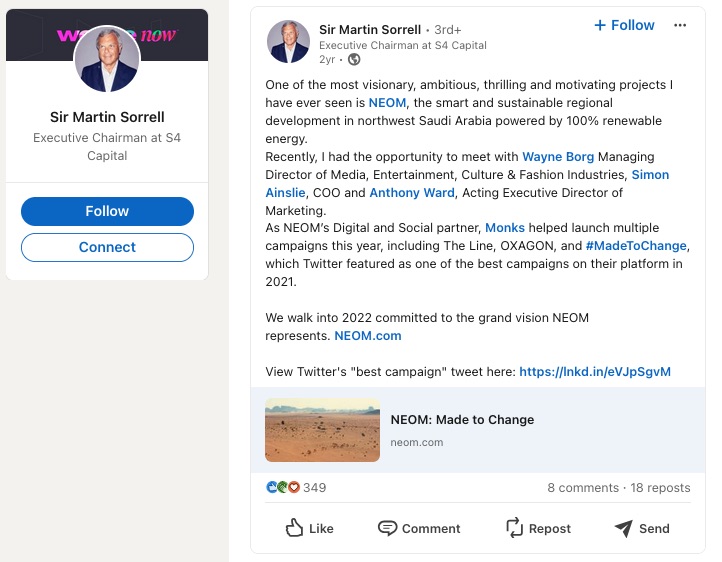
Additional contributors to the new campaign included Google; Mathematic, a Paris-headquartered design studio that had also worked on videos for Trojena; Whisper, a UK-based production company; and Starcom, Leo Burnett, and Saatchi & Saatchi – all subsidiaries of the French holding group Publicis. Whisper and McCann Enterprise had previously collaborated on videos for Tonomus, Neom’s so-called “hyperconnected cognitive city,” which both Edelman and the DC lobbying shop Brownstein Hyatt Farber Schreck have also helped promote.
“What is Neom?” featured a particularly close partnership between Neom and Google Creative Works, an operation within the tech giant that helps companies monetize Google users’ data and attention. According to a February 2024 case study written by a former Neom marketing executive and published by Google, “what is Neom?” sought to use detailed tracking and targeting of browsing behavior by Google search and YouTube users to change how viewers thought about Neom.
The campaign’s entry point was a series of “15-second teaser video ads” on YouTube and other platforms. If viewers engaged with the teaser videos, they were then “automatically shown” a longer video that “used simple, conversational language to demystify the complexity of the Neom project, which was critical to the campaign’s storytelling element,” the case study said. Many of the videos emphasized Neom’s environmental claims. Neom is “an entirely new model for sustainable living,” stated one video. “Call it what you want, but it’s a place that’s going to change the way we live on this planet,” said another.
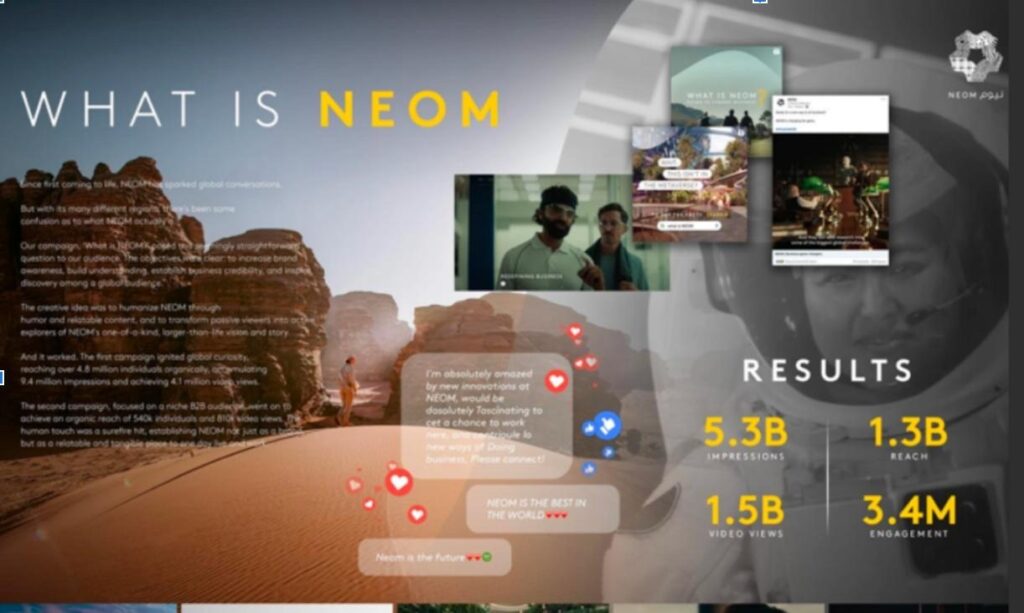
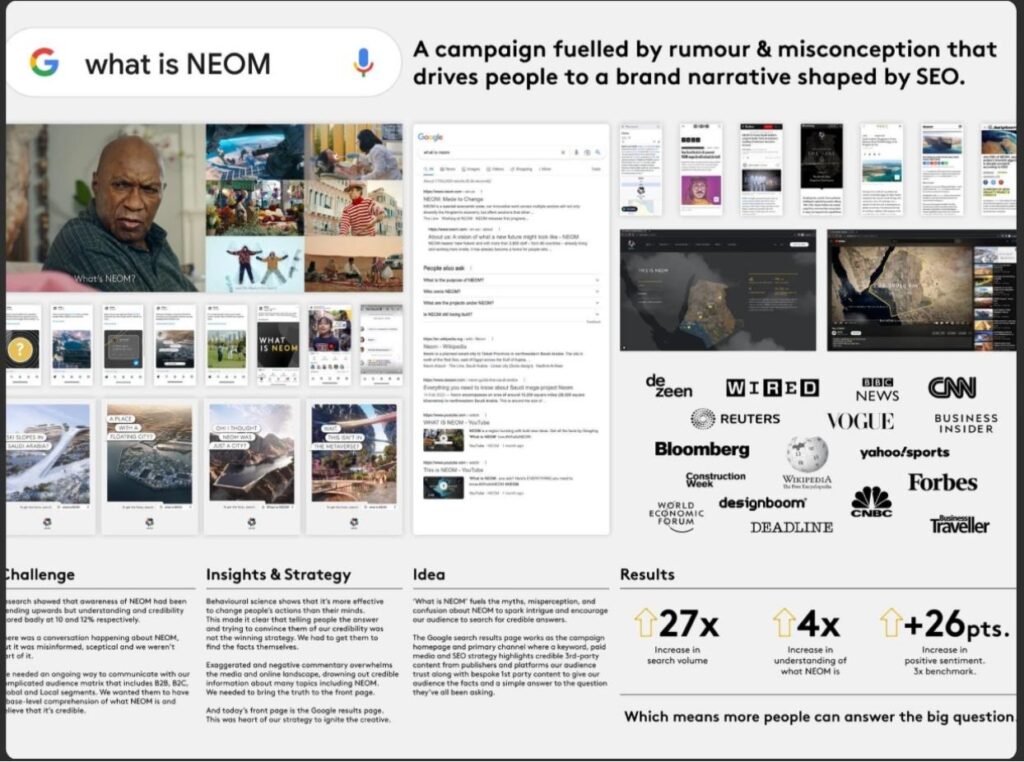
Creating the campaign involved “an incredibly fast turnaround shoot that spanned the globe,” said one Whisper employee in an interview published on LinkedIn. “A real feat of impressive logistics delivered by the team!” For McCann Enterprise’s part, the “what is Neom?” videos involved a team of at least 14 employees, according to a celebratory LinkedIn post by the company’s chief creative officer.
“Exaggerated and negative commentary overwhelms the media and online landscape, drowning out credible information about many topics including Neom,” McCann Enterprise wrote in a separate case study. “We needed to bring the truth to the front page. And today’s front page is the Google results page.”
According to McCann Enterprise, for the 2023 project it hired Ipsos, a survey firm, in part to track Neom’s “brand health.” In May, a few months after “what is Neom?” launched, some journalists opened their inboxes to find that they were being asked to fill out an “Ipsos Survey for Neom.” The request came from KARV, the independent PR agency based in New York City. (It is unclear whether the Ipsos survey distributed by KARV is the same one referenced in the McCann Enterprise case study.) Earlier that year, KARV had signed a $980,000 contract to provide “Neom leadership” with “strategic communications and media relations,” including “strategic positioning counsel” and “messaging and editorial support,” via Richard Attias & Associates.
This wasn’t KARV’s first time doing business with the Saudi government. In February 2019, barely four months after Jamal Khashoggi’s disappearance, KARV head Andrew Frank personally signed a contract with the PIF. Crown Prince Mohammed’s position as chair of the investment fund means it is effectively controlled by him.
The PIF “is just MBS [Mohammed bin Salman] himself,” Abdullah Alaoudh, the senior director for countering authoritarianism at the DC-based Middle East Democracy Center, told DeSmog. “I don’t know why they call it [a] sovereign wealth fund. It’s just MBS’s wealth fund, basically.” (KARV’s work for the PIF would eventually bring in more than $3 million.)
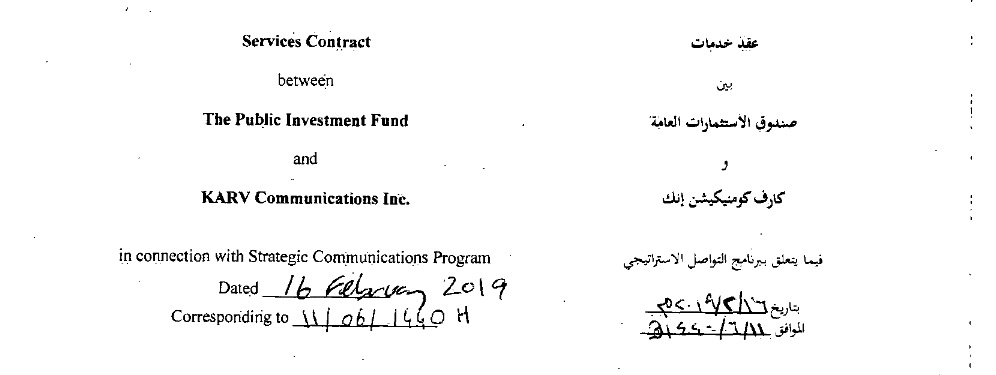
In a statement emailed to DeSmog, a KARV spokesperson said, “KARV works in conjunction with Richard Attias & Associates in providing strategic communications, messaging, and media relations support to Neom as it aims to address the world’s greatest challenges through advancements in healthcare, education, economic opportunity, and sustainability.”
***
Among the numerous projects that “what is Neom?” sought to introduce to the world was Trojena, Neom’s ski resort and one of its most heavily promoted endeavors. In fact, another arm of McCann Worldgroup had already been involved in Trojena: In early 2022, around the same time that McCann Enterprise was portraying Neom as “made to change,” the U.S.-based McCann New York had been gearing up to help launch the mountain resort.
Trojena, according to the “STORY OF NEOM” internal branding document created by McCann Worldgroup and obtained by DeSmog, will house “The Vault,” a “folding village” and “vertical city inside of a mountain with its own microclimate,” as well as “the first outdoor ski resort in Saudi Arabia” with “30 km of planned ski slopes.”
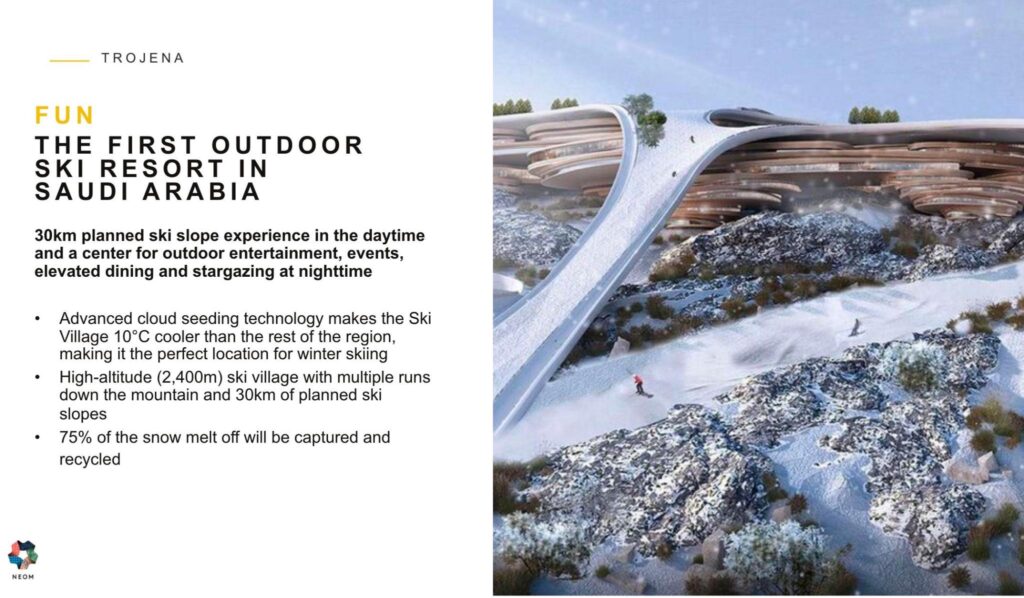
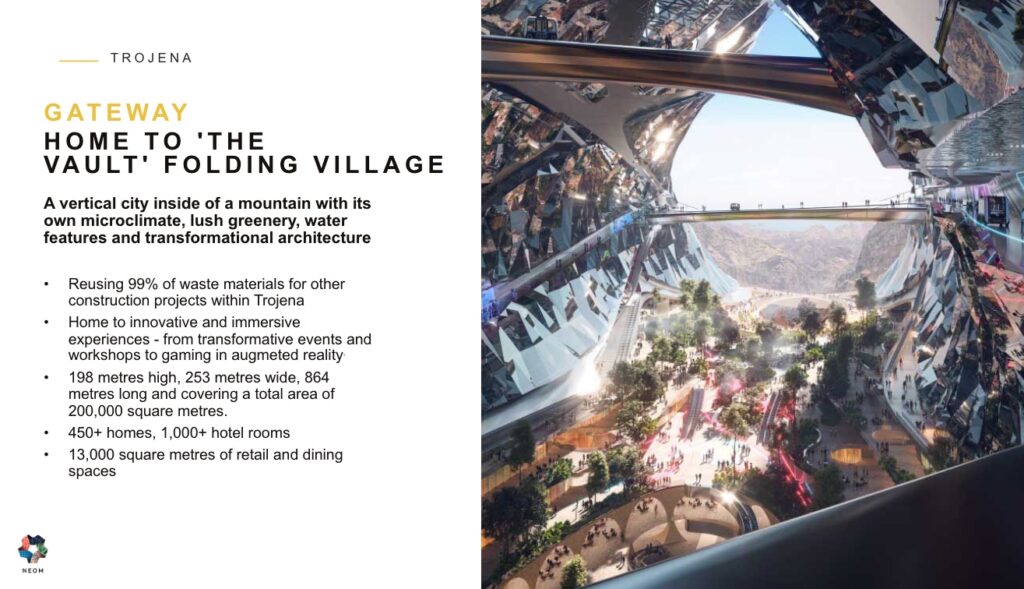
To bring this implausible-sounding concept to life, McCann New York worked with Joy Films — which was also involved in the “made to change” and “what is Neom?” campaigns — to create a video portraying a group of skiers and snowboarders racing uphill in the snow, through an avalanche, before shooting into the sky under the slogan, “journey to new heights.” The video has racked up more than 17 million views on YouTube, though experts cautioned that these numbers are to be interpreted with some skepticism, given the Saudi government’s record of using bots and troll farms to boost social media numbers and harass critics.
Neom also took the companies’ work beyond social media. With the help of Pixel Artworks, a UK-based “immersive experience” company, Neom splashed the agencies’ Trojena imagery across huge moving billboards in Riyadh, Times Square, and London’s Piccadilly Circus.
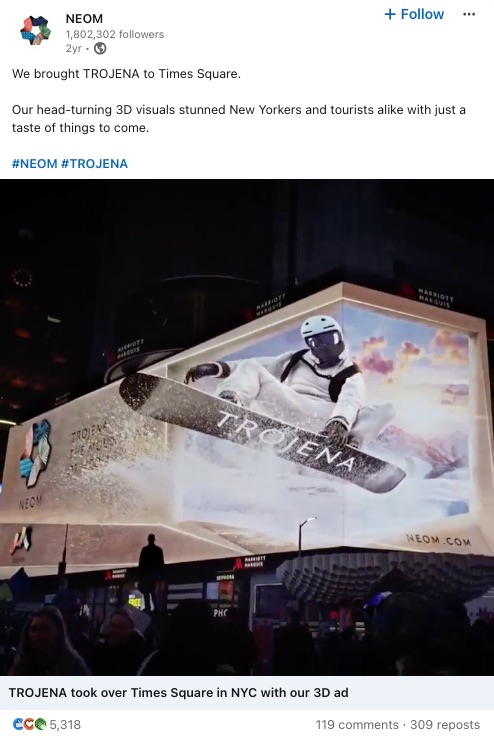
This campaign put Neom’s commitment to sustainability front and center. Sometimes the message was implicit: Winter sports, by definition, require water and cold temperatures. Other times, the agencies were more direct. “Trojena will redefine mountain tourism for the world by creating a place based on the principles of ecotourism, highlighting our efforts to preserve nature and enhance the community’s quality of life,” read one unattributed quote included in a case study published by Squint/Opera, a UK-based creative shop owned by the U.S. agency Journey.
The same quote was also attributed to Crown Prince Mohammed in a press release — distributed by Teneo — that accompanied Trojena’s launch. The release also quoted Nadhmi Al-Nasr, Neom’s CEO, describing Trojena as “a major contribution to achieving Neom’s long-term ambitions by adhering to the principles of sustainability.”
Pixel Artworks, Joy Films, and Squint/Opera have each won other contracts with Neom. All three, for instance, have promoted The Line; Pixel Artworks says its video about the hypothetical horizontal city has generated more than 157 million YouTube views. And many continue to generate revenue from Neom. In March, Joy Films posted a video on Instagram about its ongoing work for Elanan, Neom’s “unique wellness retreat embedded in nature.” (KARV and Teneo have also promoted Elanan.)
Whether projects like Elanan, Trojena, and The Line actually come to life or remain in the digital realm of slide decks and social media promises, the image of Neom — and the sprawling, interconnected web of contracts that helps create that image — serves an important function for the Saudi government.
“I think what happened with Neom is that there’s so much money at stake that … what it managed to do is to buy people’s silence, including companies and states,” Lina Alhathloul, the head of monitoring and advocacy for ALQST, told DeSmog. Alhathloul’s sister, Loujain, an activist for women’s rights in Saudi Arabia, was jailed by the government for more than three years and is still banned from leaving the country.
“Everyone [is] accepting Saudi money in exchange for silence,” Lina Alhathloul said.
IV. ‘Hydrocarbons…for Many, Many Decades to Come’: A Kingdom Committed to Oil
In January 2024, Neom invited investors, politicians, corporate executives, and other attendees of the World Economic Forum in Davos to drop by “Neom House,” a pop-up space branded with Neom’s logo and emblazoned with environmental imagery. Some of the building’s walls appeared to be covered in greenery. A nearly floor-to-ceiling graphic described Neom as “redefining the circular economy” and “powered by 100 percent clean energy.” Interactive screens showed visitors how Neom would “redefine livability, business, and conservation,” Neom later said.
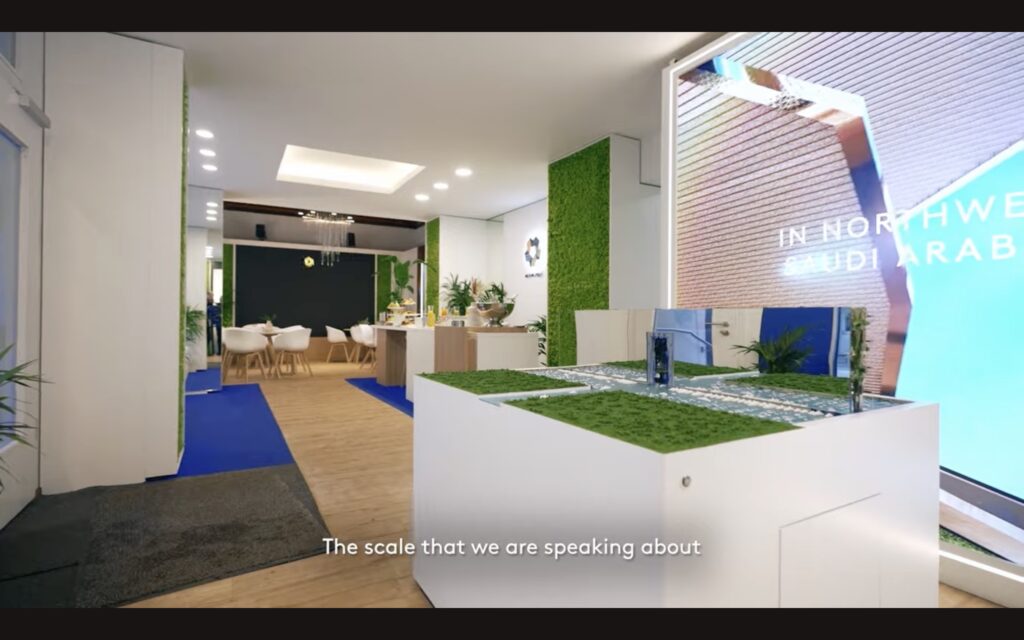
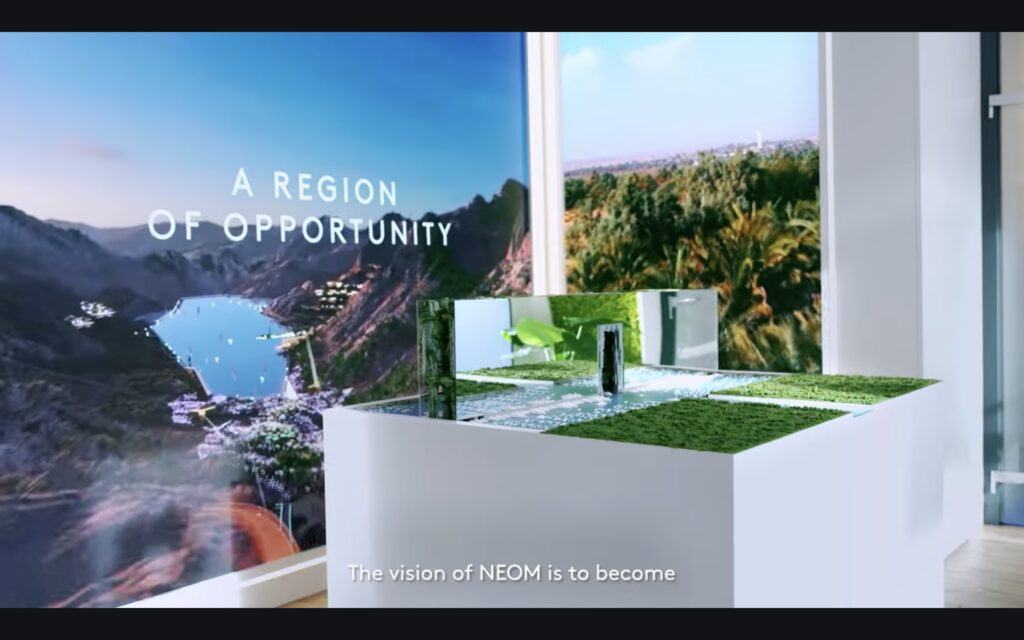
Throughout the week, Neom House, which was designed in part by the same Pixel Artworks that had done work for Trojena and The Line, hosted a series of conversations about the city’s progress and potential. Many of these events seemed designed to create the image of a government leading the fight for global climate action. (Among those touting the promise of Neom to investors was Eric Cantor, the former majority leader of the U.S. House of Representatives.)
Despite the green imagery and messaging surrounding the events, some officials who spoke at Neom House offered a different take on the government’s climate agenda. During a discussion about “mitigation through proactive action,” Adel Al-Jubeir, the Saudi minister of state for foreign affairs — and, since 2022, the country’s climate envoy — told the audience, “We want to be a realistic partner, and we want the world to be realistic,” employing a common rhetorical tactic of Saudi officials to caricature calls for the phase-out of fossil fuels as naïve or a “fantasy.” “We are saying that hydrocarbons will be the main source of energy for the world for many, many decades to come,” Al-Jubeir said.
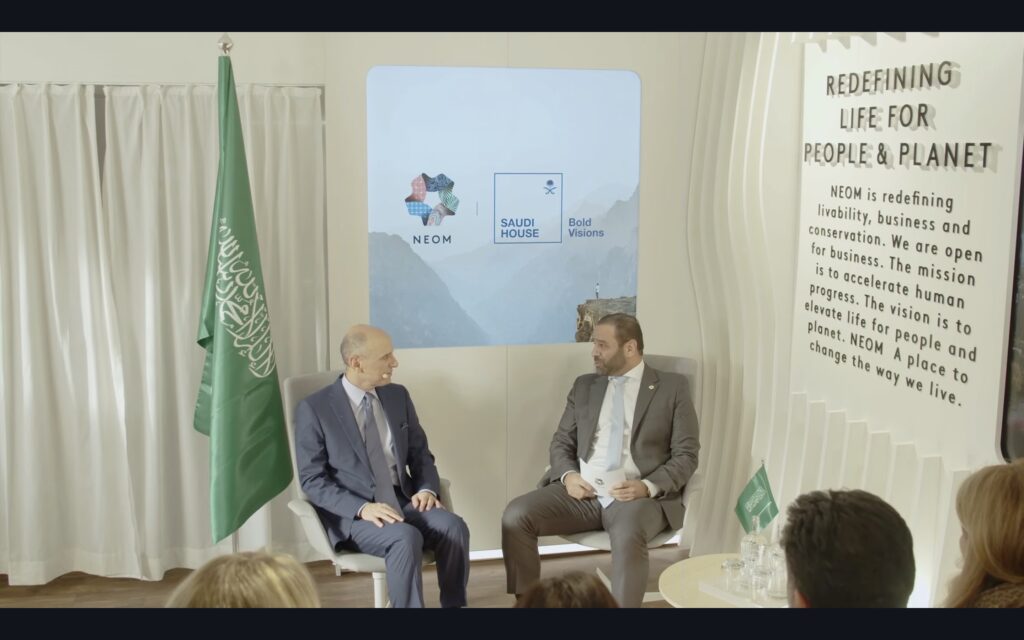
Saudi Arabia is the biggest exporter of oil in the world. Nearly two-thirds of government revenues stem from oil. Saudi Aramco, the state-run oil giant valued at around $2 trillion, is one of the world’s most valuable and most profitable companies. The kingdom controls around 82 percent of Aramco; the PIF, which owns Neom, also owns around 16 percent of Aramco — a stake worth around $160 billion. (McCann Worldgroup, Hill & Knowlton, Publicis, BCW, IPG, Mathematic, and FleishmanHillard are among the Western advertising and PR firms named in this story that have also worked for Aramco. The oil giant has also spent millions of dollars on sponsored content deals with the in-house creative studios of Western media outlets, including the New York Times, Financial Times and Reuters, in recent years, according to previous reporting by DeSmog and Drilled).
“We’re trying to redefine how businesses coexist with nature,” Rayan Fayez, Neom’s deputy CEO, told Richard Attias at a 2023 FII Institute event. “Everything that we’re doing today at Neom has nature and environment at the core.”
Yet the city’s construction is funded by oil sales, and the government’s entire operating model — including its investments in Neom and the crown prince’s other “giga-projects,” such as Diriyah, a $63 billion tourism development that will supposedly boast 38 hotels, and Jeddah Central, a waterfront project for which the Saudi government has also faced criticism for forcibly evicting local residents — depends on continuing to sell as much oil as possible, for as long as possible.
“The crown prince [is] worried about all this talk about climate change and renewable energy — all of that creates tension in his mind because Saudi Arabia depends on selling oil,” LSE’s Madawi Al-Rasheed told DeSmog. “If oil becomes the ‘bad’ energy, then he’s stuck.” That’s why, even as Saudi policymakers work to reduce the kingdom’s own reliance on fossil fuels — an aim Neom might in fact support if its solar energy, desalination, “green” hydrogen, and other renewable energy projects come to fruition — the kingdom continues to work diligently to obstruct efforts that could reduce global demand for oil.
In a 2008 paper, Cambridge University scholar Joanna Depledge summed up the Saudi government’s approach to international climate negotiations as “striving for no.” Thanks to its negotiators’ savvy tactics, including sowing disagreements among different countries, challenging established science about climate change, promoting false solutions to the crisis, and leveraging procedural rules and objections to stall discussions, “Saudi Arabia has been extremely successful in diverting the agenda and debates of the climate change government away from those issues it opposes, and towards those it supports,” Depledge argued.
More than 15 years later, Depledge told DeSmog that what she wrote in that 2008 paper “nearly all still applies.” The Saudi government “has a thirty-year record of obstruction and delay, protecting its national oil and gas sector, and seeking to ensure UN climate talks achieve as little as possible, as slowly as possible,” Depledge and two co-authors wrote in 2023. “From Saudi Arabia’s perspective, ambitious global climate action is … more of a threat than climate change itself.”
Last year the nonprofit Centre for Climate Reporting (CCR) revealed the existence of a Saudi government effort, known as the Oil Demand Sustainability Program, which “aims to boost oil consumption across Asia and Africa, with the ultimate goal of protecting Saudi oil revenues from efforts to phase out fossil fuels,” CCR’s Lawrence Carter and Tom Costello wrote. At last year’s UN climate summit, meanwhile, Saudi negotiators “flatly opposed any language in a deal that would even mention fossil fuels,” the New York Times reported. (Saudi Arabia is reportedly one of a group of oil-dependent countries already working to make sure the upcoming UN summit in Azerbaijan does not call for a global phaseout of fossil fuels, according to the Financial Times.)
While Saudi Arabia is far from the only country committed to obstructing and delaying climate action, its efforts have proven particularly successful and, as Depledge and her co-authors noted, provided cover for the United States other nations that benefit from continued fossil fuel production but would rather not be seen as spoilers.
Then there’s the environmental impact of Neom itself. Despite the rhetoric and imagery pushed by the city and its Western consultants, experts and observers are skeptical that many of Neom’s projects can match their green hype. The Line, for instance, “will require a truly colossal quantity of materials, with emissions likely much higher than those produced in building a typical city,” predicted Philip Oldfield, a professor of architecture at the University of New South Wales in an opinion piece in the New York Times. In May, the Wall Street Journal reported that Neom was building multiple gas power plants “to power the region until greener energy is sourced.”
“Trojena is a ski resort with fake snow. ‘Preserve the environment’ when you need to create new snow? It’s just not credible,” ALQST’s Lina Alhathloul told DeSmog. “The Line actually cuts the environment and removes all [of] the nature and all of the animals. It removes it completely.”
Trojena and The Line are “the two most famous projects in Neom,” Alhathloul said, and “the two main projects are clearly not green.”
V. ‘A Model for Sustainable Living’: Cashing in on the Idea of Neom
While Western companies have been eager partners in portraying Trojena, The Line, and other Neom endeavors as green, many have proven equally adept at transforming their work for Neom into contracts with other parts of the Saudi government.
In 2020, the independent agency Ruder Finn agreed to a $1.7 million deal to promote Neom’s corporate social responsibility (CSR) programs, including by creating videos that “tell the story of CSR and its impact on the beneficiaries and the local community.”
In the contract, Ruder Finn described itself as “a women-owned business with a strong commitment to diversity and inclusion.” Members of the LGBTQ community routinely face repression by the Saudi government. Lina Alhathloul’s sister, Loujain, remains one of numerous women’s rights activists in detention. “Saudi Arabia’s own record on women’s rights is abysmal,” Amnesty International’s Sherine Tadros told the Guardian. (Ruder Finn declined to comment.)
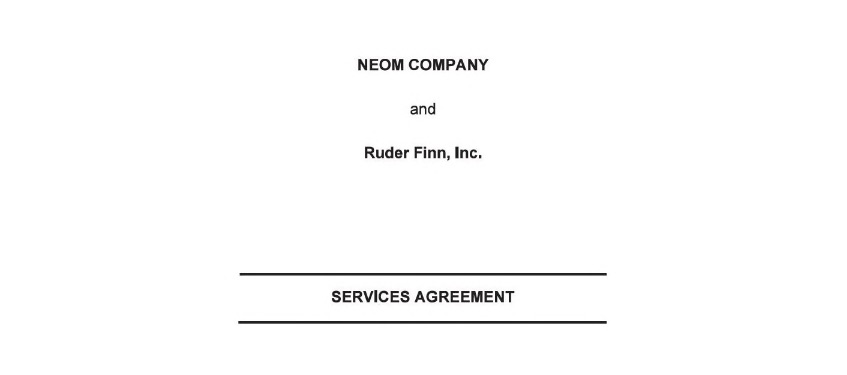

A few years after wrapping up its work for Neom, Ruder Finn notified the DOJ that the firm had signed a contract with the country’s defense ministry to provide “strategic counsel, media relations, media monitoring, and content strategy and creation.” Kathy Bloomgarden, Ruder Finn’s CEO, personally registered with the DOJ to work on both contracts.
Edelman, another independent firm that also began working for Neom in 2020, followed a similar path. According to DOJ filings, the company’s first contract with Neom, signed in November 2020, was expected to generate $75,000 a month for three months — a small sum for a firm that would bring in $840 million in revenue that year. Since then, however, Edelman has signed at least a dozen additional contracts and contract extensions with Neom and the Saudi government. Together these projects appear likely to generate more than $10.8 million for the firm, according to DeSmog’s analysis.
As with Ruder Finn, Edelman’s work for Neom appears to have opened the door to work for other Saudi government agencies — and involved the firm’s most senior executive. In July 2022, Richard Edelman, Edelman’s CEO, hosted an invitation-only breakfast for Joseph Bradley, the head of Tonomus, one of Neom’s flagship projects. A few months later Richard Edelman registered with the DOJ as a foreign agent representing the Saudi culture ministry. The following year Richard Edelman hosted another “roundtable breakfast,” this time as part of the firm’s work promoting a “sustainable tourism” initiative for the Saudi tourism ministry.
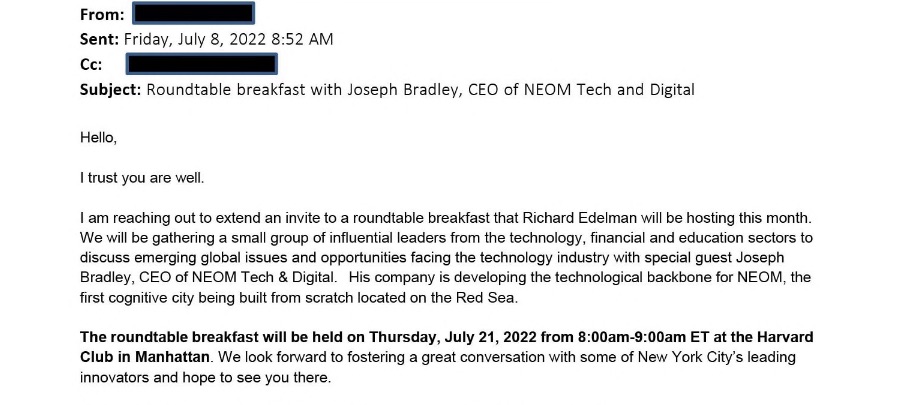
In response to a request for comment, Edelman referred DeSmog to its human rights policy and its public report on “citizenship.”
In May 2023, Neom Green Hydrogen Company — a joint venture between Neom, Air Products, and ACWA Power, which itself is partly owned by the Saudi PIF — announced an $8.4 billion investment valuation for a “green” hydrogen plant located in Oxagon, a floating industrial development “powered by renewable energy.” (Edelman, Teneo, and Landor have also promoted Oxagon.) Hill & Knowlton, a U.S.-based firm, appears to have won industry awards for its work for Neom Green Hydrogen Company, including a campaign titled “Pioneering a green hydrogen future,” which won an industry award for “Best Campaign Demonstrating Environmental Initiatives.” Hill & Knowlton is listed as a media contact in an Air Products filing with the U.S. government.
Earlier this year Hill & Knowlton merged with BCW to form Burson, which itself is part of London-headquarted WPP, one of the world’s largest communications conglomerates. According to federal filings, ASDA’A BCW, a subsidiary of BCW, signed its first contract with the Saudi government in January 2017, before linking up with Neom in the spring of 2020 for $390,000 worth of work.
Burson is not the only WPP subsidiary to work for Neom. Landor (formerly Landor & Fitch) “worked through 24-hour shifts” to create Neom’s “brand idea and narrative,” according to a case study written by the company. Landor has been supporting Neom “since 2017,” one executive said last year, and has “many more Neom projects in the pipeline.”

VI. ‘You Want to Maintain That Image’: Perception Is Reality
The web of Western agencies’ involvement with the Saudi government can appear endless, likely with stronger and more numerous connections than will ever become public. Even so, one firm stands out for its success cashing in on the idea of Neom.
According to federal filings with the DOJ, the strategy consulting firm Teneo began its work for Neom in May 2019, barely eight months after Jamal Khashoggi’s murder. In an agreement worth more than $2 million, Teneo agreed to provide the city with messaging, communications, crisis response, and executive coaching. Both the contract and Teneo’s DOJ filings noted that Douglas Band, a former close aide to former U.S. president Bill Clinton and then president and co-founder of Teneo, would be personally involved in the work. (Band left the company in 2020.)
Teneo’s early efforts were evidently to the Saudi government’s liking. Teneo agreed to another contract with Neom with an “effective date” of November 1, 2019 — shortly after many media outlets and human rights groups had marked the one-year anniversary of Khashoggi’s assassination at the Saudi consulate in Istanbul, and only weeks after Turkey’s government revealed transcripts of the journalist’s struggle with the Saudi hit squad sent to intercept him. (The assassins flew to and from Istanbul on planes owned by the PIF.) “You’ll suffocate me” were Khashoggi’s final words before his death.
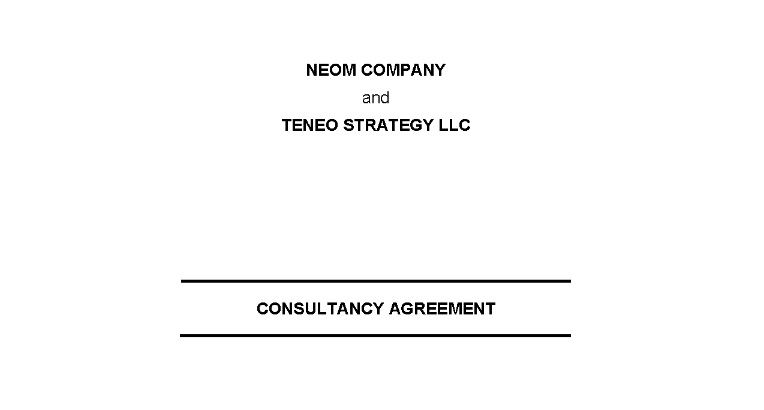



In its federal filings about the $900,000 agreement, Teneo said it would “manage the Neom Communications Department” and “provide leadership of the department as well as staff resources to ensure the foreign principal’s corporate messages and positioning are effectively communicated.” The company’s responsibilities included preparing “a Crisis Preparedness capability for Neom,” according to the contract. Teneo signed two additional contracts with Neom in 2020, bringing in an additional $1.2 million. In August 2021, Teneo’s work for the Saudi government expanded beyond Neom when the firm agreed to work for the PIF. The same month Teneo signed another $3.3 million contract with Neom.
Since 2022, Teneo has signed at least nine additional contracts and contract extensions with Neom, the PIF, and another entity created in part by the PIF (and 80 percent owned by it) that, in Teneo’s words, exists “to offer guidance and resourcing to support businesses and industry in the MENA [Middle East and North Africa] region as they play their part in the global transition to net zero.” All together, Teneo’s work for the kingdom appears to have been worth more than $30 million so far.
“We are also establishing a model for sustainable living around the world,” said Al-Nasr, the Neom CEO, in a press release distributed by Teneo.
***
From Teneo to McCann to Google to Edelman, the web of prestigious and influential Western companies doing business with Neom and the Saudi government is vast and deeply interconnected — and impossible to map in full. This opacity stems from a powerful combination of aggressive nondisclosure agreements, strident corporate obfuscation, and an overwhelming torrent of marketing and PR imagery that blurs the boundary between what is real, and what exists only in digital simulations and science fiction-style YouTube videos.
For both the Saudi government and its Western contractors, the distinction between the real and the imaginary appears irrelevant: The image of Neom as a sustainable city of the future is ultimately what matters.
What is inescapably real, however, is the amount of money involved, and the growing demand among autocratic oil-producers for help revamping their reputations and selling a green image to domestic audiences and throughout Western capitals. This lucrative ecosystem extends well beyond the borders of Neom: In April, Teneo won a $4.2 million contract with the authoritarian government of Azerbaijan to handle communications for next month’s COP29 UN climate conference.
“The whole point of this kind of dictatorship is [to] make believe that everything is so rosy and great,” said LSE’s Madawi Al-Rasheed. “And if you’re targeting partners such as the West — companies, global businesses, banks — then you don’t want them to hear about the bad side of the country. You want to maintain that image.”
Additional reporting by TJ Jordan
Subscribe to our newsletter
Stay up to date with DeSmog news and alerts


